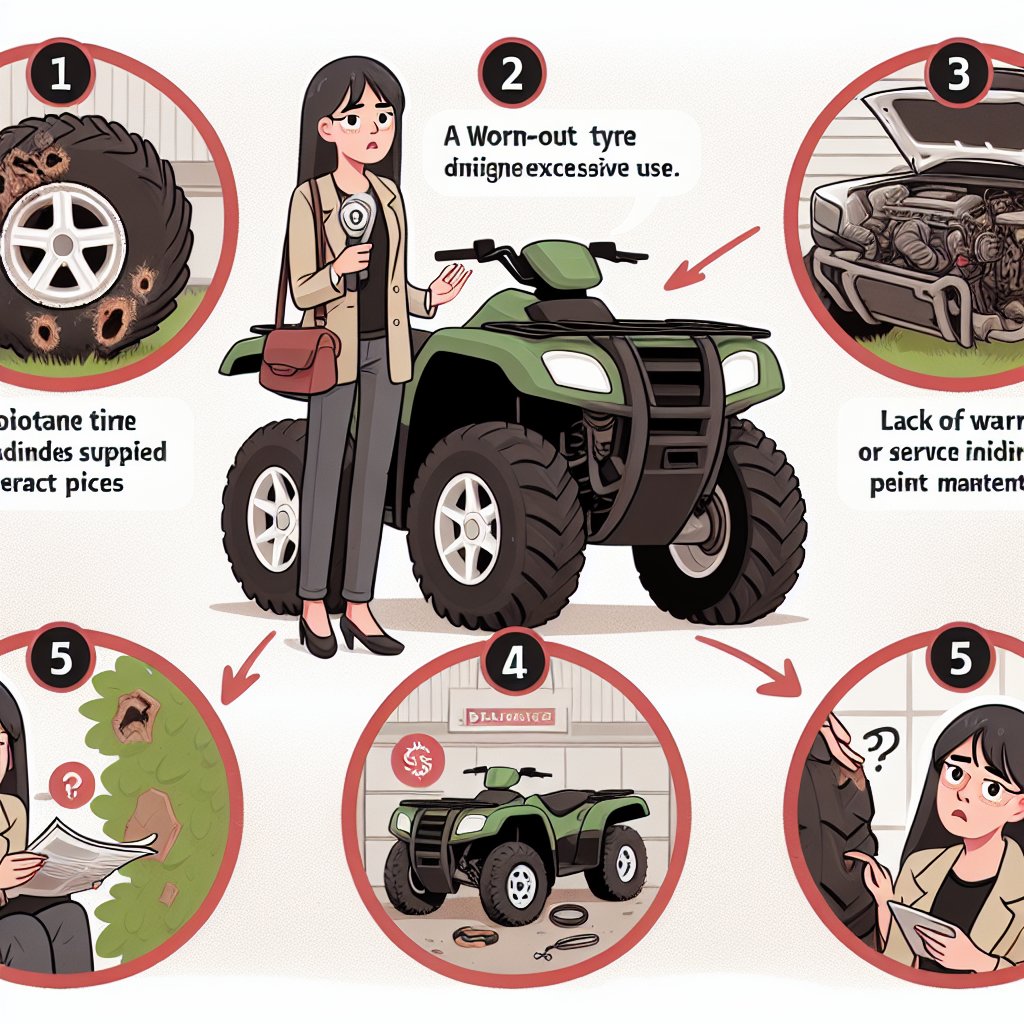5 Signs You’re Getting Ripped Off on an ATV

-
Table of Contents
“Spot the Red Flags: 5 Signs You’re Getting Ripped Off on an ATV!”
When purchasing an all-terrain vehicle (ATV), it’s crucial to ensure you’re getting a fair deal. Unfortunately, the market can be rife with pitfalls that may lead to buyers feeling cheated. Recognizing the signs that you might be getting ripped off can save you from a regrettable investment. Here are five key indicators to watch for when evaluating an ATV purchase, helping you make an informed decision and protect your wallet.
Unusually Low Price Compared to Market Value
When considering the purchase of an all-terrain vehicle (ATV), one of the most critical factors to evaluate is the price. While it is natural to seek a good deal, an unusually low price compared to the market value can be a significant red flag. This discrepancy often indicates that the vehicle may not be in the condition that the seller claims or that there are hidden issues that could lead to costly repairs down the line. Therefore, understanding the implications of a price that seems too good to be true is essential for any prospective buyer.
To begin with, it is important to conduct thorough research on the average market value of the specific make and model of the ATV you are interested in. This involves looking at various sources, including online marketplaces, dealership listings, and classified ads. By gathering this information, you can establish a baseline price that reflects the typical cost for a vehicle in good condition. If you encounter a listing that is significantly lower than this average, it warrants further investigation.
Moreover, an unusually low price can often be a tactic employed by unscrupulous sellers who aim to attract buyers quickly. In many cases, these sellers may be looking to offload a vehicle that has been poorly maintained or has underlying mechanical issues. For instance, if an ATV has been involved in an accident or has sustained damage that is not immediately visible, the seller may reduce the price to expedite the sale. Consequently, it is crucial to approach such listings with caution and to consider the potential costs associated with repairs or maintenance that may be required shortly after purchase.
In addition to mechanical concerns, a low price may also indicate that the seller is not being transparent about the vehicle’s history. This lack of transparency can manifest in various ways, such as failing to disclose previous accidents, title issues, or even the existence of liens against the vehicle. Therefore, it is advisable to request a vehicle history report, which can provide valuable insights into the ATV’s past. If the seller is unwilling to provide this information or seems evasive when questioned about the vehicle’s history, it is wise to reconsider the purchase.
Furthermore, it is essential to consider the seller’s credibility. If the ATV is being sold by an individual rather than a reputable dealership, the risk of being ripped off increases significantly. Individual sellers may not have the same level of accountability as established businesses, making it easier for them to misrepresent the vehicle’s condition or history. In such cases, it is prudent to ask for references or to seek out reviews of the seller if available. A lack of positive feedback or a history of complaints can further indicate that the low price is a warning sign rather than a bargain.
Ultimately, while the allure of a low price can be tempting, it is crucial to approach such offers with a discerning eye. By conducting thorough research, seeking transparency regarding the vehicle’s history, and evaluating the credibility of the seller, you can protect yourself from potential pitfalls. In the world of ATV purchases, being informed and cautious can save you from making a regrettable decision that could lead to significant financial loss. Therefore, always remember that if a deal seems too good to be true, it often is.
Lack of Documentation or Title
When considering the purchase of an all-terrain vehicle (ATV), it is crucial to ensure that the transaction is legitimate and that you are not being taken advantage of. One of the most significant red flags to watch for is a lack of documentation or title. This aspect is not merely a bureaucratic formality; it serves as a vital indicator of the vehicle’s ownership history and legal standing. Without proper documentation, you may be entering into a risky situation that could lead to financial loss or legal complications.
Firstly, the absence of a title raises immediate concerns about the vehicle’s ownership. A title is a legal document that proves ownership and is essential for registering the ATV with the appropriate authorities. If the seller cannot provide a title, it may indicate that the vehicle is stolen or that there are unresolved liens against it. In such cases, you could find yourself in a precarious position, as purchasing a stolen vehicle can lead to legal repercussions, including the potential loss of the ATV without any recourse for reimbursement.
Moreover, documentation serves as a record of the vehicle’s history, including previous owners, maintenance records, and any accidents or damages it may have sustained. When a seller is unable or unwilling to provide this information, it raises questions about the ATV’s condition and reliability. A lack of maintenance records, for instance, could suggest that the vehicle has not been properly cared for, leading to potential mechanical issues down the line. Consequently, you may end up spending significantly more on repairs than you initially anticipated, negating any savings you thought you were achieving by purchasing the ATV at a lower price.
In addition to ownership and maintenance history, the absence of documentation can also complicate the registration process. Each state has specific requirements for registering an ATV, and without a title, you may find it impossible to complete this essential step. This situation can lead to frustration and additional costs, as you may need to pursue alternative methods to obtain a title, which can be time-consuming and expensive. Furthermore, if you are unable to register the ATV, you may be unable to legally operate it, rendering your purchase essentially worthless.
Transitioning from the legal implications, it is also important to consider the ethical dimensions of purchasing an ATV without proper documentation. Engaging in a transaction that lacks transparency can contribute to a broader culture of dishonesty and exploitation within the marketplace. By insisting on proper documentation, you not only protect yourself but also promote ethical practices among sellers. This commitment to due diligence can help foster a more trustworthy environment for all buyers and sellers in the ATV market.
In conclusion, a lack of documentation or title is a significant warning sign that should not be overlooked when considering the purchase of an ATV. The potential legal ramifications, combined with concerns about the vehicle’s condition and the challenges associated with registration, make it imperative to prioritize proper documentation in any transaction. By remaining vigilant and informed, you can safeguard your investment and ensure that your ATV purchase is both legitimate and satisfactory. Ultimately, taking the time to verify documentation can save you from future headaches and financial losses, allowing you to enjoy your ATV with peace of mind.
Poor Condition or Signs of Neglect
When considering the purchase of an all-terrain vehicle (ATV), it is crucial to be vigilant about the condition of the vehicle, as poor condition or signs of neglect can indicate that you are being ripped off. One of the first signs to look for is the overall appearance of the ATV. A well-maintained vehicle should exhibit a clean and polished exterior, free from excessive rust, scratches, or dents. If the ATV appears neglected, with a dirty frame or faded paint, it may suggest that the previous owner did not take proper care of it. This lack of maintenance can lead to underlying mechanical issues that may not be immediately visible.
Furthermore, inspecting the tires is essential, as they are one of the most critical components of an ATV. Tires that are worn unevenly or have significant cracks can indicate that the vehicle has been subjected to rough handling or has not been properly maintained. Uneven wear may also suggest alignment issues or suspension problems, which could lead to costly repairs down the line. Therefore, if the tires show signs of neglect, it is prudent to question the overall condition of the ATV.
In addition to the exterior, the engine compartment should also be thoroughly examined. A clean engine is often a sign of a responsible owner, while a dirty or greasy engine can indicate neglect. Accumulated dirt and grime can hide potential problems, such as oil leaks or worn-out components. Moreover, if the engine shows signs of rust or corrosion, it may suggest that the ATV has been exposed to moisture or has not been stored properly. This can lead to significant mechanical failures, making it imperative to assess the engine’s condition carefully.
Another critical area to inspect is the suspension system. A well-functioning suspension is vital for the performance and safety of an ATV. If the suspension components appear worn or damaged, it may indicate that the vehicle has been subjected to rough terrain without proper care. Additionally, listen for any unusual noises when testing the suspension, as clunks or rattles can signal underlying issues that may require expensive repairs. Therefore, if the suspension shows signs of neglect, it is a strong indicator that the ATV may not be worth the investment.
Moreover, it is essential to check the maintenance history of the ATV. A lack of documentation regarding regular maintenance can be a red flag. Responsible owners typically keep records of oil changes, filter replacements, and other routine services. If the seller cannot provide this information, it raises concerns about the vehicle’s upkeep. Without a clear maintenance history, you may be left with an ATV that has hidden problems, leading to unexpected expenses in the future.
In conclusion, being aware of the signs of poor condition or neglect is vital when purchasing an ATV. By carefully examining the overall appearance, tires, engine compartment, suspension system, and maintenance history, you can make a more informed decision. If you notice any signs of neglect, it is wise to proceed with caution, as these indicators may suggest that you are being ripped off. Ultimately, investing time in thorough inspection and research can save you from potential headaches and financial losses down the road.
Q&A
1. **Question:** What is a common sign that the price of an ATV is too good to be true?
**Answer:** If the price is significantly lower than similar models in the market, it may indicate that the ATV is being sold with hidden issues or is a scam.
2. **Question:** How can you tell if the seller is not being transparent about the ATV’s condition?
**Answer:** If the seller avoids answering specific questions about the ATV’s history, maintenance, or any damages, it’s a red flag that they may be hiding problems.
3. **Question:** What should you look for in the paperwork to avoid being ripped off?
**Answer:** Ensure that the title is clear and that there are no liens against the ATV; discrepancies in paperwork can indicate potential fraud or ownership issues.In conclusion, recognizing the signs that you might be getting ripped off when purchasing an ATV is crucial for making an informed decision. Key indicators include unusually low prices compared to market value, lack of proper documentation or history, visible signs of damage or neglect, pressure to complete the sale quickly, and vague or evasive answers from the seller regarding the ATV’s condition. Being aware of these signs can help you avoid potential scams and ensure you invest in a quality vehicle.





